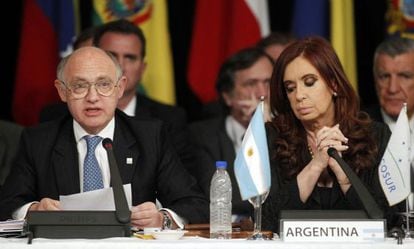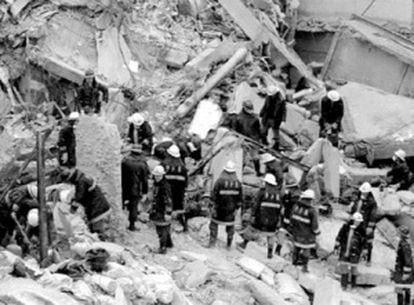Argentina leader accused of cover-up over 1994 Jewish center bombing
Prosecutor says Fernández de Kirchner conspired to hide Iran’s involvement in case


A prosecutor investigating the fatal 1994 car bombing of a Jewish center in Buenos Aires has accused Argentinean President Cristina Fernández de Kirchner and some members of her government of conspiring to cover up Iran’s involvement.
Alberto Nisman, who has been investigating the attack at the Israeli-Argentina Mutual Association (AMIA), which left 85 people dead and dozens injured, demanded that Fernández Kirchner and government officials testify about their roles in reaching an agreement in 2013 with Iran regarding the inquiry.
Fernández de Kirchner and her officials decided “to negotiate and arrange impunity for the Iranian fugitives in the AMIA case” with the purpose of “freeing the defendants and fabricating Iran’s innocence,” Nisman wrote in a 300-page writ.
The president’s chief of staff said the prosecutor’s allegations of complicity were absurd
Aníbal Fernández, who serves as the president’s chief of staff, said the prosecutor’s allegations were absurd, adding that the treaty with Iran was approved by both the Senate and the Chamber of Deputies.
“The president has the right to sign treaties and Congress must approve them,” he said. “It doesn’t make sense what is happening. Why doesn’t the prosecutor call in all the senators and deputies so that they can testify?”
After 20 years, it is still not clear who set off the car bomb on July 18, 1994 at the Jewish center in Buenos Aires’ Once district. It was the worst attack on the Jewish community since World War II. Subsequent investigations immediately suggested that the government of Iran had been in involved.
In 2006, prosecutors Nisman and Marcelo Martínez Burgos formally accused Iran of planning the attack and Hezbollah of carrying it out. International arrest warrants were issued for suspects in the case, including Iran’s former defense minister Ahmad Vahidi, who at the time was a commander of a special unit of Iran’s Revolutionary Guards.

Other suspects include Ali Fallahijan, former Iranian intelligence minister; Mohsen Rezaee, former government advisor; Mohsen Rabbani, the then-attaché at the Iranian Embassy in Buenos Aires; Ahmad Reza Asghari, a former diplomatic official; and Imad Fayez Mughniyeh, a senior member of Hezbollah who reportedly died in Syria in 2008.
The investigation appeared to hit a dead end until January 2013 when Fernández de Kirchner tweeted that Argentina had reached an “historic agreement” with Iran. The two nations agreed to create a “Truth Commission” empaneled with international jurists to look into the AMIA car bombing.
Up until then, Iran had vehemently denied any involvement.
The agreement sparked outrage among local Jewish community leaders. Israel sent a diplomatic note of protest to Buenos Aires reminding Fernández de Kirchner that the United Nations had isolated Iran.
Nisman wrote that the agreement was nothing more than “the culmination” of a two-year conspiracy
Nisman wrote that the agreement was nothing more than “the culmination of a criminal maneuver that was two years in the making.” According to the prosecutor, the president’s objective was to “get politically closer to the Islamic Republic of Iran and re-establish state-to-state trade relations to help alleviate the Argentinean energy crisis through the exchange of grain for oil.”
Nisman accused Fernández de Kirchner of coming up with the plan, which was carried out by her Foreign Minister Héctor Timerman. He also accused of being part of the alleged conspiracy Andrés Larroque, a ruling party deputy; Luis Ángel D’Elía and Fernando Luis Esteche, both Socialist officials; Héctor Luis Yrimia, a former judge and prosecutor; and Jorge Alejandro “Yussef” Khalil, who acted as liaison between the government and the Iranian community.
In his writ, Nisman also asked that the president and her officials pay a 200-million peso bond (equivalent to €19.7 million) until the investigation is complete.










































